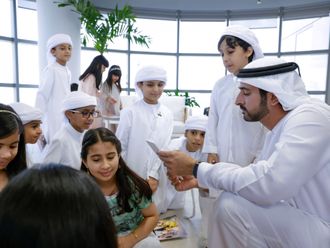Abu Dhabi: A law to protect children against all forms of negligence, exploitation and physical and psychological abuse has been issued.
President His Highness Shaikh Khalifa Bin Zayed Al Nahyan issued Federal Law No. 3 of 2016 on child rights, also called Wudeema's Law.
The law stipulates children’s basic rights to live and be safe, and that all competent authorities and concerned bodies have to work together to ensure the protection of children’s rights.
Children shall be raised in an environment that encourages them to adhere to their Islamic faith and be proud of their national identity. Children will be educated about their rights, commitment and duties in a society where values of justice prevail.
The law says that children have the right to be given citizenship and protects their lineage. It gives children the right to be registered under the names of their parents.
Children’s right to be given a name that does not demean them, harm their dignity or contradict their religious beliefs and social norms. Children must be given a birth certificate immediately after they are born. The law prohibits children’s exposure to any abusive interference or illegal procedure in their daily lives.
The law bans child labour, and stipulates that children can only begin working once they reach the age of 15 years. It bans the economic exploitation and recruitment of children in any work that endangers their lives.
The family rights of children are also protected in this law, obliging parents or guardians to provide all requirements of family safety for children to live in a cohesive household. The parents or guardians of children will bear the responsibility and duty for a child’s upbringing.
It also provides for children’s health rights. Under the law, children will have access to health services according to healthcare rules in the country. The law stipulates that the UAE should develop its capabilities in the field of healthcare, preventive and curative medicine to ensure the wellbeing of children.
The law bans the sale of tobacco to children under the age of 18. It bans smoking in public and private transport, as well as indoor facilities, if children are present. It bans the sale of alcohol or any other dangerous substances to children, as well as selling food, nutritional supplements, herbal and toys that can endanger a child’s life.
The law safeguards children’s social rights that stipulate for providing children with appropriate living standards that ensures the proper physical, mental and psychological growth of children.
The cultural rights of children are protected under the new law. Children have the right to access all means of innovation, creativity and knowledge, as well as participation in entertainment, cultural, scientific and art programmes that are in accordance with their age groups.
Each child has the right to education, and the country has to provide equal opportunities to children without any kind of discrimination. The law protects children from being abandoned or left without a breadwinner in case of losing their parents. It also safeguards children from negligence, sexual abuse and being homeless. It bans the endangering of a child’s mental, psychological or physical safety either by their parents or guardians abandoning them.
It also prohibits using children in any photographs, recordings or production of pornography. The law bans children’s access to pornography material.
The law determines child protection mechanisms, obliging competent authorities and bodies concerned to coordinate with the Ministry of Social Affairs to set up child protection shelters.
The law prohibits all those who have been convicted in sexual abuse crimes from working in any job that has them directly communicating or interacting with children.
The Cabinet will issue the executive regulations of the law within six months of the issuance of this law in the official gazette. The law is to be published in the official gazette and comes into effect three months following its issuance.












